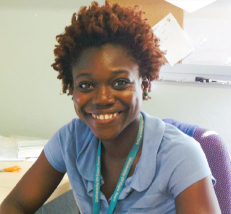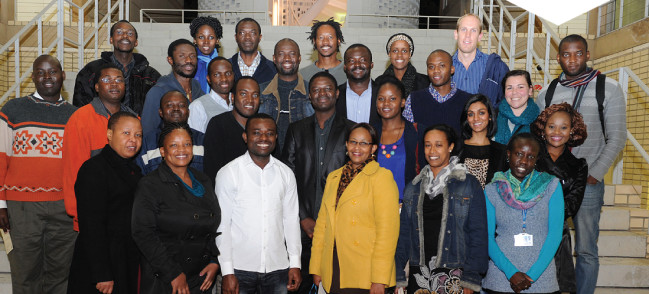A fourth generation of Carnegie scholars was welcomed to UCT in 2014 as part of the Next Generation of Academics in Africa Project. Funded by the Carnegie Corporation, which recognised the importance of preparing young potential academics for university careers, this extensive programme runs at four major universities in Africa: UCT, the University of the Witwatersrand, Makerere University (Uganda) and the University of Ghana. It targets postgraduate students and postdoctoral research fellows from Africa who are keen to pursue careers in academia. The programme aims both to strengthen higher education in Africa and to train a more demographically diverse community of academics for the continent.
Drawing on the partners involved in the Carnegie project, the four universities will increase collaboration through supportive supervision relationships, by encouraging fellows to build networks with their counterparts in the other partner universities, and in supporting Carnegie graduates – academically and professionally – when they return to their home institutions. Over the length of the project, almost 100 new academics will be produced for the continent. To date, it has graduated 21 PhDs, and seven postdoctoral fellows have completed their tenures. At the time of writing, three Carnegie scholars had secured academic positions and a further one was about to take up his academic appointment.
Today’s academics face a range of challenges due to the increasing complexity of the world and the research environment. The competition is not just faced by individuals, but by universities, countries and entire continents, argues Professor Danie Visser, Deputy Vice-Chancellor with responsibility for research. “You can’t be competitive as a country or a continent if you don’t have strong universities that drive research.”
At UCT, participants are selected from three fields where lucrative career options in the private and public sectors mean that an academic career is often not the first choice (clinicians, engineers and economists) and where the research is particularly pertinent to Africa.
“We are trying to foster a community of people so that we can get that sense that we are doing something significant for our continent,” says Professor Visser. A quick scan of Africa-specific research being undertaken by current Carnegie scholars demonstrates the importance of this work. Projects range from the economics of tobacco control in Zambia to property rights in Nigeria; from climate change vulnerability in Tanzania to the relationship between health and the labour market in South Africa; and include multiple research projects on malaria, TB and HIV/AIDS.
Above photo: Some of the 2014 generation of Carnegie scholars (l-r) Back row: Faridah Chebet Chemisto, Kabani Matongo, Adérijo Monjane, Aleyo Chabeda and Brian Kullin. Third row: Philemon Arito, David Fadiran, Yusuf Agabi, Sulemana Mahawiya, Imuentinyan Aivinhenyo, David Ikumi, Roslyn Ray and Adeola Oyenubi. Second row: John Okedi, Rodrick Katete, Fredrick Nindo, Munya Musvosvi, Trust Mpofu, Hazvinei Tsitsi Tamuka Moyo, Krupa Naran and Zanele Ditse. Front row: Threza Mtenga, Mamello Nchake, Chijioke Nwosu, Elizabeth Lwanga Nanziri, Mhbuba Shifa and Nina Wasuna.
Filling in the knowledge gaps

Dr Tolu Oni
Carnegie fellow Tolu Oni, a senior research medical officer affiliated to the Clinical Infectious Disease Research Initiative (CIDRI) in the Faculty of Health Sciences, is determined to make a contribution through her research to improving the health of urban populations in Africa – especially for the poor.
According to Oni, rapid urbanisation in Africa has been accompanied by changes in cultural, social and lifestyle behaviour resulting in reduced physical activity and other unhealthy dietary and behavioural patterns, which has led to a rise in the incidence of non-communicable diseases (NCDs) like diabetes and heart disease. At the same time, there is an increasing overlap between these chronic conditions and infectious diseases, such as TB and HIV/AIDS, which is creating a perfect storm for public health that requires further investigation.
Poor people living in urban settings, fuelled by a high prevalence of obesity, are disproportionately affected, she says.
“A scarcity of good-quality data on how these diseases overlap and interact and their interaction with external or environmental factors is a significant barrier to designing appropriate prevention and control strategies,” says Oni. “Many of these factors are beyond the healthcare remit, necessitating involvement of all relevant disciplines to ensure informed, healthier public policies.”
This is where she hopes her research will make a contribution. With qualifications in medicine, public health and epidemiology, Oni began her medical training at the University College London Medical School and went on to complete postgraduate studies in internal medicine together with HIV medicine in the UK and Australia. In 2007, she moved to Cape Town to work in HIV/TB research, completing her doctorate in the Clinical Epidemiology of HIV-associated TB at Imperial College London.
It was during her research in Cape Town that she became interested in the rise of NCDs and their interaction with chronic infectious diseases. She is currently investigating the association between TB and diabetes, as well as the epidemiology of NCD risk factors in HIV-infected persons.
Understanding the root of economic problems
With a dream of studying economics, Ethiopian-born Mhbuba Shifa’s passion arose from a deep-rooted curiosity to understand the reasons behind the economic problems at home.
Her academic career started with a business science degree in statistics at Addis Ababa University, Ethiopia. This progressed into a full bursary for her master’s in economic science at UCT. Shifa became a Carnegie scholarship recipient in 2011 and she was awarded a further scholarship for the following two years to study for a PhD in economics.
Shifa feels privileged and touched to be a Carnegie scholar; it has also had practical advantages: “Receiving support from the Carnegie Corporation has developed my career as an independent researcher, providing me with more protected research time.”
The Carnegie Corporation’s support allows Shifa the access and capacity to delve into her research interests in Ethiopia, which include rural livelihoods, land and labour markets, agricultural productivity, poverty and inequality.



Comments are closed.